高中英语《Unit 1 Word power》教案 新人教版选修6
人教版高中英语(选修6—选修11)电子课本目录(普通高中课程标准实验教科书)
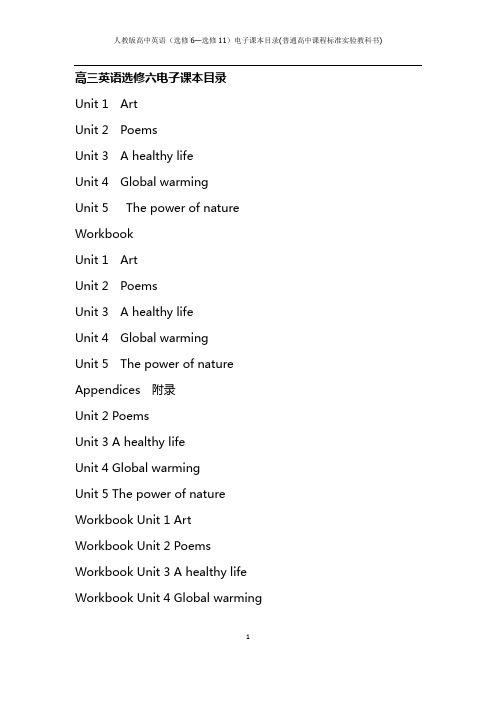
高三英语选修六电子课本目录Unit 1 ArtUnit 2 PoemsUnit 3 A healthy lifeUnit 4 Global warmingUnit 5 The power of nature WorkbookUnit 1 ArtUnit 2 PoemsUnit 3 A healthy lifeUnit 4 Global warmingUnit 5 The power of nature Appendices 附录Unit 2 PoemsUnit 3 A healthy lifeUnit 4 Global warmingUnit 5 The power of nature Workbook Unit 1 ArtWorkbook Unit 2 Poems Workbook Unit 3 A healthy life Workbook Unit 4 Global warmingWorkbook Unit 5 The power of natureAppendices Notes to the textsAppendices GrammarAppendices Words and expressions in each unit Appendices VocabularyIrregular VerbsChanges in international phonetic symbols for English 后记高三英语选修七电子课本目录Unit 1 Living wellUnit 2 RobotsUnit 3 Under the seaUnit 4 SharingUnit 5 Travelling abroadWorkbookUnit 1 Living wellUnit 2 RobotsUnit 3 Under the seaUnit 4 SharingUnit 5 Travelling abroadAppendices 附录高三英语选修八电子课本目录Unit 1 A land of diversityUnit 2 CloningUnit 3 Inventors and inventionsUnit 4 PygmalionUnit 5 Meeting your ancestorsWorkbookUnit 1 A land of diversityUnit 2 CloningUnit 3 Inventors and inventionsUnit 4 PygmalionUnit 5 Meeting your ancestorsAppendicesNotes to the textsGrammarWords and expressions in each unitVocabularyIrregular verbsChanges in international phonetic symbols for English高三英语选修九电子课本目录Unit 1 Breaking recordsUnit 2 Sailing the oceansUnit 3 AustraliaUnit 4 Exploring plantsUnit 5 Inside advertisingWorkbookUnit 1 Breaking recordsUnit 2 Saililing the oceansUnit 3 AustraliaUnit 4 Exploring plantsUnit 5 Inside advertisingAppendicesNotes to the textsGrammarWords and expressions in each unitvocabularyIrregular verbsChanges in international phonetic symbols for English高三英语选修10电子课本目录Unit 1 Nothing Ventured, nothing gainedUnit 2 King LearUnit 3 Fairness for allUnit 4 Learning efficientlyUnit 5 Enjoying novelsWorkbookUnit 1 Nothing ventured, nothing gainedUnit 2 King LearUnit 3 Fairness for allUnit 4 Learning efficientlyUnit 5 Enjoying novelsAppendicesNotes to the textsGrammarWords and expressions in each unitVocabularyIrregular verbsChanges in international phonetic symbols for English高三英语选修11电子课本目录Unit 1 Nex ZealandUnit 2 Detective storiesUnit 3 Finding the correct perspectiveUnit 4 Legends of ancient GreeceUnit 5 Launching your careerWorkbookUnit 1 New ZealandUnit 2 Detective storiesUnit 3 Finding the correct perspectiveUnit 4 Legends of ancient GreeceUnit 5 Launching your careerAppendicesNotes to the textsWords and expressions in each unitVovabularyIrregular verbsChanges in international phonetic symbols for English。
英语:Unit1_Word_power课件(牛津译林版选修6).
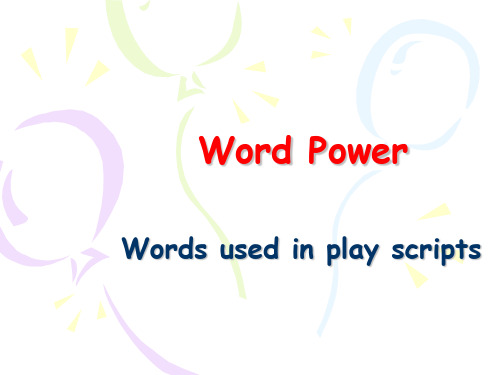
4. What will an actor read in a script?
Actor’s lines and stage direcd one-act plays? Very short plays.
Part B: More words
eg: When Mary found out about the holiday, she was all smiles.
Homework:
Recite all the useful expressions related to drama.
1. What do we call the person who acts in a play?
An actor. An actress.
2. What do we call the person who is in charge of a play? A director.
3. What is a script made up of? Acts and scenes.
Word Power
Words used in play scripts
a piece of writing to be performed by actors; a play for theatre, TV, radio, etc.
Let’s enjoy a drama!
AInHreyaWovtuehreayrtooepudiaonenivoyyenord,uriaknacnmotoerawddceailrnubbotasuotat dradpmuraaty?moouIanrfpasnecdorhrtfoa,oomdrlmoa?,iynogu?
what pwraenptartaotaiocntsinshaodulrdambea?made? lead-in:
【全国百强校】安徽省芜湖市第一中学高中英语选修六Unit1 Word power课件 (共46张PPT)

Ⅲ Teaching important and difficult points
Ⅳ Choices of teaching and learning approaches
Contents
Ⅴ Invitation of teaching aids Ⅵ Introduction to teaching procedures Ⅶ Blackboard design Ⅷ My idea of this design
Ⅰ .
Understanding
of the material
&
analysis of my students
Understanding of the material
1 Aiming at enriching Ss' vocabulary
2
The extension of this unit in content
2
Ⅴ. The invitation of teaching aids
The multimedia 1 2 The blackboard
Teaching procedures
1 Greetings and lead-in 2 Presentation 3 More words related to acting 4 Consolidation 5 Summary 6 Assignment
Step 1
Revision
Step 1
Lead-in
1. Have you ever performed on a stage? 2. Do you enjoy your performance? 3. How do the audience like your performance?
Unit 1,M11,Word power教学案

Unit 1, Module 11 Careers and skillsWord power【教学目标】To enlarge students’ vocabulary。
To get students to learn some words and expressions related to different jobs.To improve students’ speaking ability.【教学重难点】Ss are expected to familiarize themselves with the new words and expressions. 【教学方法】Task-based approachesIndividual, pair or group work.【教学工具】The multimedia and the blackboard【教学过程】Step 1. Lead-inPlease say some names of different jobs.Step 2 JobsA: Read “Different types of jobs” on page 6 and find out the names of different types of jobs.1. Practical jobs2. Caring jobs3. Analytical jobs4. Entertainment jobs5. Educational jobs6. Technical and Scientific jobs7. Jobs based on information technology8. Public service jobsStep 3 Part BYang Min selected four jobs from the article and made a table showing what qualities a person needs for each job. Look at the table and find out the different qualities that go with each job.Step 4 Part CYang Min wrote an e-mail to a friend about her thoughts on possible jobs. Complete the e-mail she wrote using the information from Parts A and B.1 ______________________2 ____________________3 _______________________4 ______________________5 ____________________6 _______________________7 ______________________ 8 ____________________Step 5 Part DMatch each job title with its description. Write the correct letter in each blank.1 private investigator ______________2 DJ ______________3 bodyguard ______________4 dolphin keeper ______________5 weather forecast ______________6 art restorer _______________7 bird scarer _______________Step 6 GameWho did the most jobs?Do this game in class in pairs. Let’s see who can say most of the jobs. The one who says most of the jobs wins the game.Example:A: I think I did more jobs than you. I was once a chef.B: I’m afraid you are wrong. I was once a police officer.……【教学后记】。
人教版高中英语选修6:Unit1__Listening__and__speaking参考教案
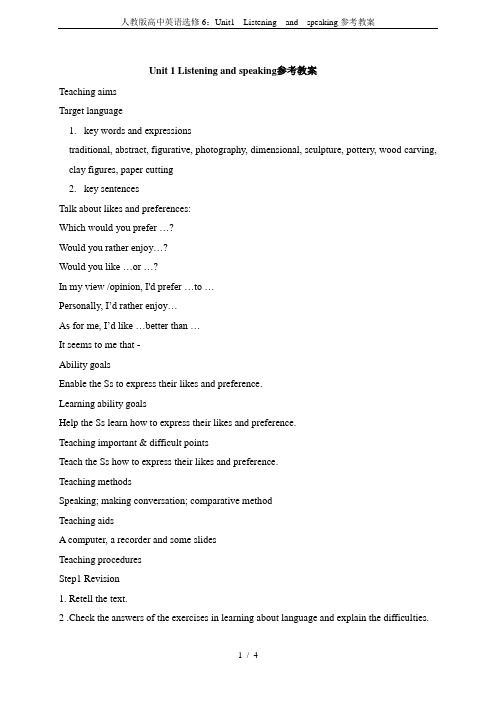
Unit 1 Listening and speaking参考教案Teaching aimsTarget language1.key words and expressionstraditional, abstract, figurative, photography, dimensional, sculpture, pottery, wood carving, clay figures, paper cutting2.key sentencesTalk about likes and preferences:Which would you prefer …?Would you rather enjoy…?Would you like …or …?In my view /opinion, I'd prefer …to …Personally, I’d rather enjoy…As for me, I’d like …better than …It seems to me that -Ability goalsEnable the Ss to express their likes and preference.Learning ability goalsHelp the Ss learn how to express their likes and preference.Teaching important & difficult pointsTeach the Ss how to express their likes and preference.Teaching methodsSpeaking; making conversation; comparative methodTeaching aidsA computer, a recorder and some slidesTeaching proceduresStep1 Revision1. Retell the text.2 .Check the answers of the exercises in learning about language and explain the difficulties.Step2 Listening① Listening on page 7T: GaoYan, Susan and John are on holiday, and they are discussing which art galleries to visit. Before listening, please answer the following questions.1. Do you think they will agree at the beginning which galleries theywill visit?2. What kind of differences of opinion might they have?First listen to the tape and finish exercise 1 on page 7and then listenagain and answer the three questions. (Slide show)1. Who is the least interested in visiting art galleries?2. Why is Gao Yan interested in visiting the Metropolitan Museum?3. Why doesn’t Susan want to go to the Museum of Modern Art?Keys: 1.Susan2. He wants to see the exhibition of Chinese art.3. It is big, crowded and too expensive.② Listening on p41T: Now let’s turn to Listening practice on p41; before listening, answerthe questions on the screen.1. Which object do you think would be the most expensive?2. If you could have one of these objects as a present, which would you choose? Why?3. If you had to buy a present for someone who was an art teacher,which present do you think he would like best?(At first, ask the Ss to listen to the tape for the first time and numberthe presents 1-4. Next, listen to it again to fill in the form.) After that,please listen to the tape again and answer the following questions.1. Why did they decide not to get the vase for Mr. Huang?2. Why did Steve Lee wish they had talked to Mrs. Huang before they went shopping?3. Which present do you think the students will get? Give your reason.Keys: 1. It was too expensive.2. Mrs. Huang would probably have known what to get for Mr. Huang.3. I think they will probably get the wall hanging because the otherssee m to respect Wang Pei’s opinion. Also, they know Mr. Huang likesthat type of wall hanging.③Listening practice on page 44.Before listening, ask the Ss to look at the paintings and discuss in what period of Chinese history they were created.Slide showListen to the tape for three times and fill in the chart.Step3 SpeakingT: So far, we have learned some know ledge about the art. Today let’s talk about how to express likes and preferences. Do you know how to express likes and preferences? (Show the following on the screen).Which would you prefer …?Would you rather enjoy…?Would you like …or …?In my view /opi nion, I'd prefer …to …Personally, I’d rather enjoy…As for me, I’d like …better than …It seems to me that -T: Look at the talking topics shown on the screen and discuss with your partner and make up a dialogue. (Show the following on the screen)Talking Topics1. Who are your favorite artists, both from China and from othercountries? Give reasons for your preferences.2.What kind of art do your prefer: modern or traditional, abstract or figurative(修饰丰富的),painting or photography, two-dimensional(两维的)(e.g. painting, photography) or three-dimensional (e.g. sculpture (雕塑), pottery)?3. What kind of Chinese art do you like best? In your discussion include examples of folk art(e.g. New Year Graphics, wood carving, papercutting, and clay figures.)4.What kind of Western art do you like best? In your discussion include examples of the Middle Ages, the Renaissance, Impressionism andModern art.Step4 HomeworkWrite a passage to introduce the galleries you have ever been to.。
高中英语 Unit 1《Getting along with others》Word power文字

Unit 1 Getting along with othersWords and expressions1. get along①get along/ on with sb. 和睦相处She works hard and is easy to get along with.They should get along well together because they have much in mon.他们在一起应该处得不错,因为他们有许多共同点。
(2008某某卷) 9. I used to quarrel a lot with my parents, but now we ______ fine.A. look outB. stay upC. carry onD. get along②get along / on (with sth.) 进展,进行How are you getting along with your English? 你的英语学得怎么样?How is your son getting along in school? 你的儿子在学校表现怎么样?The business is getting along very well. 生意经营得很不错。
They said they could get along without our help.他们说没有我们的帮助他们也能进行下去。
〔MET93〕Readers can ____ quite well without knowing the exact meaning of each word.A. get overB. get inC. get alongD. get through〔2006某某〕28.—How are you managing to do your work without an assistant?—Well, I____________ somehow. 〔总算〕A. get alongB. e onC. watch outD. set off2. betray vt.①背叛,出卖〔同〕desert, abandonbetray one’s country 叛国betray one’s f riends 背叛朋友He betrayed me. 他背叛了我。
2020-2021学年高中英语同步教案:Unit 1 Art(人教新课标选修6)

2022-2021学年高中英语同步教案:Unit 1 Art (人教新课标选修6)Book Six Unit 1 ArtⅠ重点词汇1. faith n.信仰;信任;信念have faith in sb./sth. 对某人/某事有信念 lose faith in 不再信任,对…失去信念faithful adj.忠实的 be faithful to sb. [sth.] 忠实于某人[某事]faithfully adv.忠实地1) Having faith in the masses is the requirement by government.信任群众是对政府的要求。
__________________________.2) Under no circumstances shall we lose faith in the future...在任何状况下,我们都不该对将来失去信念。
____________. 3) The newly-elected monitor declared that he would carry out his duty_ faithfully _.4)The lovers promised to be ____ faithful forever. 2. consequently adv .因此,所以= therefore=as a result consequent adj . 作为结果的,随之发生的 consequence n .(常指不利的)影响,后果,常有以下用法: as a consequence 因此,结果= in consequence=as a result as a consequence of 由于…的结果 = in consequence of = as a result of take/suffer/face the consequences 担当后果 1)He broke the law and now he must take/suffer/ face the consequences of his actions _____(担当自己的行为带来的后果). 2)The governor was found guilty , and consequently lost his position/ and lost his position in consequence/ and as a consequence lost his position _____(因而失去了职位). 3) He got a marvelous ﹙非凡的﹚achievement in consequence of his great effort ___ (由于他付出的努力) . 3. aim n. 目标;目的;瞄准vi.&vt.瞄准(向某方向)努力 (1) take aim at 向……瞄准 achieve one’s aim 达到目的 miss one ’s aim 打不中目标,达不到目的 without aim 漫无目的地 with the aim of 以期……,意在…… (2)aim at sth. 向…瞄准;旨在 aim for sth 力求达到 aim at doing sth./ aim to do sth.意欲、企图做某事, 旨在做某事 be aimed at 目的是,旨在(主语一般是物) (3)aimless adj .无目的的 1) What is your aim in life? 你生活的目的是什么? 2) He aimed the gun at the enemy officer .他用枪瞄准了敌军官。
2020-2021学年高中英语【优秀精品】同步教案【6】:Unit 1 Art(人教新课标选修6)
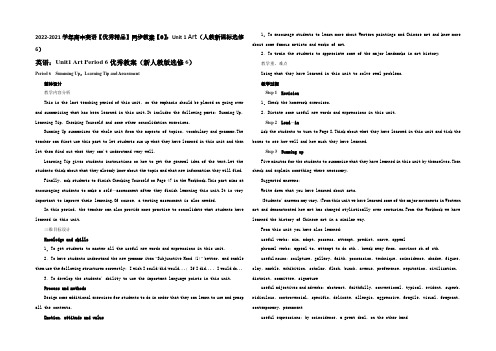
2022-2021学年高中英语【优秀精品】同步教案【6】:Unit 1 Art(人教新课标选修6)英语:Unit1 Art Period 6优秀教案(新人教版选修6)Period 6Summing Up,Learning Tip and Assessment整体设计教学内容分析This is the last teaching period of this unit,so the emphasis should be placed on going over and summarizing what has been learned in this unit.It includes the following parts:Summing Up,Learning Tip,Checking Yourself and some other consolidation exercises.Summing Up summarizes the whole unit from the aspects of topics,vocabulary and grammar.The teacher can first use this part to let students sum up what they have learned in this unit and then let them find out what they can't understand very well.Learning Tip gives students instructions on how to get the general idea of the text.Let the students think about what they already know about the topic and what new information they will find.Finally,ask students to finish Checking Yourself on Page 47 in the Workbook.This part aims at encouraging students to make a self-assessment after they finish learning this unit.It is very important to improve their learning.Of course,a testing assessment is also needed.In this period,the teacher can also provide more practice to consolidate what students have learned in this unit.三维目标设计Knowledge and skills1.To get students to master all the useful new words and expressions in this unit.2.To have students understand the new grammar item “Subjunctive Mood (1)” better,and enable them use the following structures correctly:I wish I could/did/would...;If I did...,I would do...3.To develop the students' ability to use the important language points in this unit.Process and methodsDesign some additional exercises for students to do in order that they can learn to use and grasp all the contents.Emotion,attitude and value1.To encourage students to learn more about Western paintings and Chinese art and know more about some famous artists and works of art.2.To train the students to appreciate some of the major landmarks in art history.教学重、难点Using what they have learned in this unit to solve real problems.教学过程Step 1Revision1.Check the homework exercises.2.Dictate some useful new words and expressions in this unit.Step 2Lead-inAsk the students to turn to Page 8.Think about what they have learned in this unit and tick the boxes to see how well and how much they have learned.Step 3Summing upFive minutes for the students to summarize what they have learned in this unit by themselves.Then check and explain something where necessary.Suggested answers:Write down what you have learned about arts.(Students' answers may vary.)From this unit we have learned some of the major movements in Western art and demonstrated how art has changed stylistically over centuries.From the Workbook we have learned the history of Chinese art in a similar way.From this unit you have also learned:useful verbs:aim,adopt,possess,attempt,predict,carve,appealphrasal verbs:appeal to,attempt to do sth.,break away from,convince sb.of sth.useful nouns:sculpture,gallery,faith,possession,technique,coincidence,shadow,figure,clay,marble,exhibition,scholar,flesh,bunch,avenue,preference,reputation,civilization,district,committee,signatureuseful adjectives and adverbs:abstract,faithfully,conventional,typical,evident,superb,ridiculous,controversial,specific,delicate,allergic,aggressive,fragile,visual,fragrant,contemporary,permanentuseful expressions:by coincidence,a great deal,on the other hand。
高中英语 Unit 1 Section Ⅳ Grammar & Writinh课件 新人教版选修6
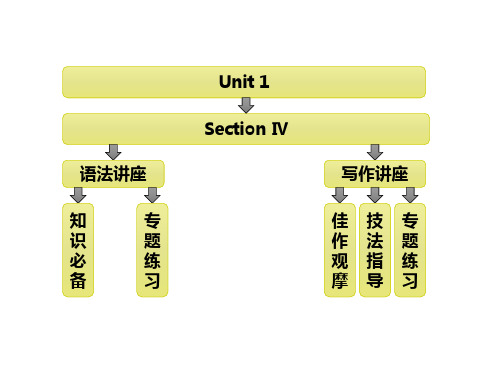
备注:与过去事实相反的虚拟语气,将在第二单元中细讲,
此处只列出
(1)与现在事实相反
If I were you, I would tell him the good news. 要是我是你,我就会告诉他这个好消息。 If we had time now, we should read it again. 要是现
[考题印证2] (2011· 北京高考)— Where are the children? The dinner’s
going to be completely ruined.
—I wish they________ always late. A.weren’t C.wouldn’t be B.hadn’t been D.wouldn’t have been
Unit 1 Section Ⅳ 语法讲座 知 识 必 备 专 题 练 习 写作讲座 佳 作 观 摩 技 法 指 导 专 题 练 习
虚拟语气(Ⅰ)
一、虚拟语气的概念
虚拟语气是谓语动词的一种形式,表示说的话不是事实, 或者是不可能发生的情况,而是一种愿望、建议或与事 实相反的假设。 If I were a bird, I could fly in the air. 如果我是一只鸟,我就能在空中飞行。
[点津] 当insist表示“坚持认为;坚持说”,suggest表示 “表明;暗示”时,后面的宾语从句不用虚拟语气。
He insisted that he had done nothing wrong.
他坚持说他没有做错。 The smile on his face suggested that he was satisfied with our work. 他脸上的笑容表明他对我们的工作很满意。
[高中英语必修选修]高中英语课件选修6unit1学案
![[高中英语必修选修]高中英语课件选修6unit1学案](https://img.taocdn.com/s3/m/33dc9a3af111f18583d05a77.png)
选修6学习目标(Learning aim): 掌握本单元的词汇及掌握一些构词法学习重点(learning points):掌握本单元的词汇及掌握一些构词法导学过程(Guiding Procedures):一.自主预习(Preview):Reading the words before the period.二.Guiding1. faith ( ) _________________●have faith in sb./sth.对某人/某事有信心lose faith in _______________________ be faithful to sb. [sth.] 忠实于某人[某事]faithful adj.忠实的faithfully ( ) _____________他对我的能力很有信心。
_____________________________2. consequently (adv.&conj.) 所以,因而=______________consequence ( n.) 后果;结果;重要性be of consequence 重要的as a consequence=as a result 结果in consequence 由于3. aim ( ) ___________;( )_______________take aim (at) 瞄准aim at向…瞄准;旨在,针对;志在be aimed at __________What is your aim in life?______________________________这次活动目的在于提高学生的英语口语。
________________________________________________________________________4. typical ()____________________________●be typical of…是…代表; 象征1) a typical character __________________2) grasp typical cases抓典型3) 她这个人就是爱迟到。
牛津高中英语模块六Unit-1-Word-power-Word-power教学说课稿
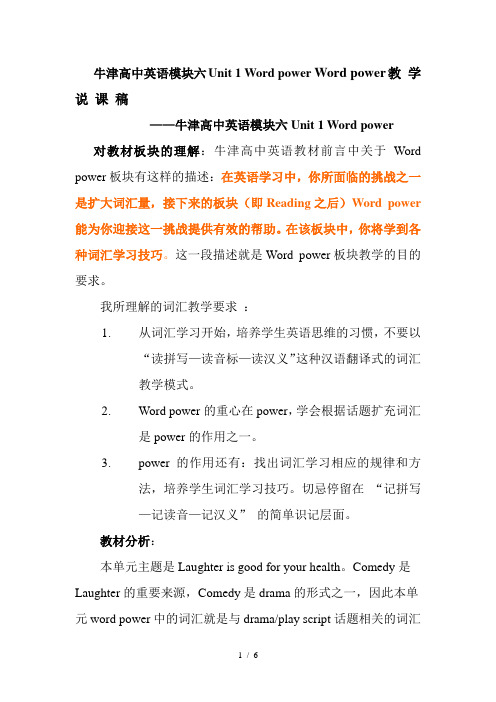
牛津高中英语模块六Unit 1 Word power Word power教学说课稿——牛津高中英语模块六Unit 1 Word power 对教材板块的理解:牛津高中英语教材前言中关于Word power板块有这样的描述:在英语学习中,你所面临的挑战之一是扩大词汇量,接下来的板块(即Reading之后)Word power 能为你迎接这一挑战提供有效的帮助。
在该板块中,你将学到各种词汇学习技巧。
这一段描述就是Word power板块教学的目的要求。
我所理解的词汇教学要求:1.从词汇学习开始,培养学生英语思维的习惯,不要以“读拼写—读音标—读汉义”这种汉语翻译式的词汇教学模式。
2.Word power的重心在power,学会根据话题扩充词汇是power的作用之一。
3.power的作用还有:找出词汇学习相应的规律和方法,培养学生词汇学习技巧。
切忌停留在“记拼写—记读音—记汉义”的简单识记层面。
教材分析:本单元主题是Laughter is good for your health。
Comedy是Laughter的重要来源,Comedy是drama的形式之一,因此本单元word power中的词汇就是与drama/play script话题相关的词汇扩充。
本单元的word power可以分为三类:1、与表演有关的剧本(含剧本、台词等词汇)2、表演环境(含舞台布置方面的词汇)3、演职人员及其要求教学目标:知识目标:通过本堂课学习,扩充关于performing的词汇相关的词汇。
能力目标:学会用mind-mapping和word tree的方式来记忆词汇,自己学做一个word tree。
情感目标:了解与表演有关的词汇,培养表演的兴趣?联系保卫钓鱼岛进行爱国主义教育。
教学重难点:理解和掌握本单元的新词汇cast ,prop,costume,script,microphone;突破act,cast,curtain,wing,scenery 等词汇在表演的专业术语中的词义理解。
高中英语人教版选修六教案Unit 1单元教案(word版)
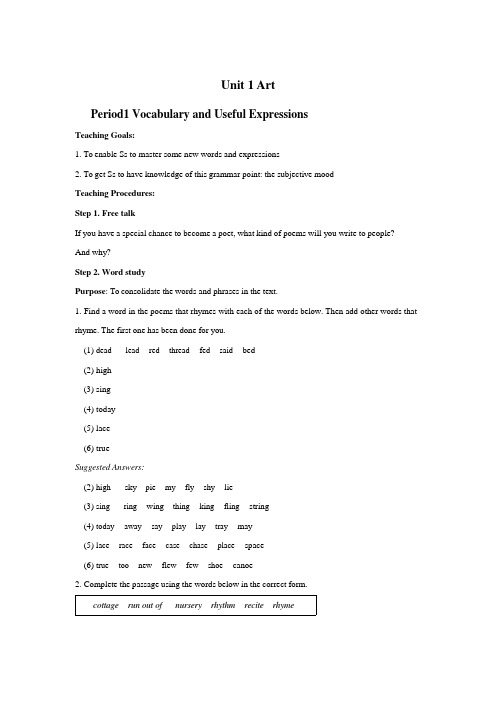
Unit 1 ArtPeriod1 Vocabulary and Useful ExpressionsTeaching Goals:1.To enable Ss to master some new words and expressions2.To get Ss to have knowledge of this grammar point: the subjective moodTeaching Procedures:Step 1. Free talkIf you have a special chance to become a poet, what kind of poems will you write to people?And why?Step 2. Word studyPurpose: To consolidate the words and phrases in the text.1.Find a word in the poems that rhymes with each of the words below. Then add other words that rhyme. The first one has been done for you.(1)dead lead red thread fed said bed(2)high(3)sing(4)today(5)lace(6)trueSuggested Answers:(2)high sky pie my fly shy lie(3)sing ring wing thing king fling string(4)today away say play lay tray may(5)lace race face case chase place space(6)true too new flew few shoe canoeplete the passage using the words below in the correct form.c o t t a g e r u n o u t o f n u r s e r y r h y t h m r e c i t e r h y m eWhen I was a baby, my mother used to read me rhymes, I loved their and the way the words at the end of the lines. By the time I was two years old, I could at least ten of them. When we new nursery rhymes, my mother would go to the store to buy another nursery rhyme book. In fact, my family loved reading so much that the living room in our was full of books.Suggested Answers:nursery; rhythm; rhyme; recite; run out of; cottage.3.In English we sometimes add –ful to a noun to make an adjective. For example, wonder becomes wonderful. This means full of wonder. Now make adjectives form these nouns. Then add four other pairs you know.(1)beauty (5) dread (9)(2)joy (6) hope (10)(3)sorrow (7) peace (11)(4)delight (8) power (12).Suggested Answers:(1) beautiful (2) joyful (3) sorrowful (4) delightful (5) dreadful(6) hopeful (7) peaceful (8) powerful (9) thankful (10) successful (11) painful (12) usefulplete the table with the correct nouns, verbs, adjectives or adverbs.Verb AdverbNoun AdjectiveangrydarkenimpressiverepetitivetransformationaltranslationwarmenjoyexpressivelyinspireSuggested Answers:Verb AdverbNoun Adjectiveanger anger angry Angrilydark darken dark darklyimpression impress impressive impressively repetition repeat repetitive repetitively transformation transform transformational \translation translate translated \warmth warm warm wrmlyenjoyment enjoy enjoyable enjoyably expression express expressive expressively inspiration inspire inspirational inspirationallyplete each sentence using the correct word from the table you have just completed. (1)While you were reciting the poem, I think you moved your body very . It made the performance much more interesting.(2)Ad I lay in the , the words of a new poem came into my head.(3)The teacher doesn’t think that the of the Tang poem is very good.(4)Songs are often easy to remember because they a lot of poetry.(5)Your talk was so that I want to go and write lots of poetry.(6)I loved the strong images you used in your poem to convey feelings of .(7)We were very by the students’ performance of their poetry.(8)We passed the afternoon very reading poetry together under the trees.(9)Mr. Tanne r’s love of poetry has the students’ feelings towards the subject.(10)Even though it is cold, your poem about summer has made me feel really . Answers:(1) expressively (2) darkness (3) translation (4) repeat (5) inspirational (6) anger (7) impressed (8) enjoyably (9) transformed (10) warm Step 3. Grammar1.PresentationPurpose: To revise the usage of the subjunctive mood with Ss.所述情况从句主句与现在事实相反If+主语+动词过去式主语+ would/could/might/should+ (be 动词用were)动词原形与过去事实相反If+主语+动词过去完成式主语+ would/could/might/should+have + 过去分词与将来事实相反①if+主语+动词过去式主语+ would/could/might/should+②if+主语+were to + 动词原形动词原形③if+主语+should+动词原形此表中需要注意几点:(1) be 动词在表示与现在事实相反的从句中一般用were.在非正式情况先,第一、第三人称后偶尔也用was. 如:If he were you, he would go at once.(2) 主句中的should 通常用于第一人称,would,could 以及might 可以用于各种人称。
高中英语 第一单元(第一课时)教案 新人教版选修6

第一单元〔第一课时〕教案BOOK6 Unit 1ArtI、Teaching Aims:1.Learn and master the following words and phrases:religious Consequently,abstract,symbol,medium,relatively, Unlike ,pure, relationship ,values, convince,,bottom,scholar, traditionalattempt to do sth.a great deal, focus on take the place of ,in place of ,be absorbed in2.Improve the students’ reading ability.3.Enable the students to enjoy the beauty of different arts.II、Teaching Important Points:1.Improve the students’ reading ability.2.Master the following phrases:attempt to do sth.a great deal, focus on take the place of ,in place of ,be absorbed inIII、Teaching Difficult Point:Make the students understand the reading passage better.and admire the beauty of different arts.IV、Teaching Methods:1.Discussion before reading to make the students interested in what they will learn.2.Fast reading to get a general idea of the text.3.Discussion after reading to make students understand what they’ve learned better.4.Careful reading to get the detailed information in the text.V、Teaching Aids:1.Some pictures2.the multimediaVI、Teaching Procedures:Step 1 Greetings and Revision(Greet the whole class as usual.)T:In Book5, we have learnt something about first aid.Now who can tell me what is first aid?S1:First aid is a kind of help that is given to someone who hurt himself T:OK,can you tell me the reason why it is important?S2:First aid can be used to save some one’s life .T:Anything else?S3:I know something about first aid.It can give us a better relationship T:Very goodStep 2Pre-reading and ReadingT:OK.Thank you for your answers to my questions.As is known to us,we can’t live without help .But who can tell me what makes us feel better besides giving help to others?Ss:No,we don’t know.T:Maybe we can get the answer to the question after reading the article for today.Before you read,first let’s learn the new words and phrases in the passage.(Teacher deals with the new words with the whole class.)T:Now please read the passage quickly to get the general idea and try to use the words in the to plete the following blanks:〔Teacher let several students plete the blanks,and then…….〕T:Well done.Who can tell me the general idea of the text?S4:The passage mainly tells us the changes of the arts in different period of timeT:Good work.Next,let’s read the passage carefully to get more information about arts.While you are reading,try to understand the following phraseson the blackboard.:attempt to do sth.a great deal, focus on take the place of ,in place ofbe absorbed inStep 3 Post ReadingLet Ss listen to the tape and at the same time, get the answers to the following passageStep 4 HomeworkSuppose you knowa famous painter, write a letter to him and ask him how you can bee a paiter, telling him something about yourself.。
人教版高中英语必修一 Unit1 示范教案
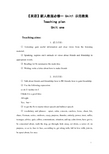
【英语】新人教版必修一 Unit1 示范教案Teaching planUnit oneTeaching aims:1. 能力目标:①Listening: gain useful information and clear views from the listening material;②Speaking: express one’s attitude or views about friends and friendship in appropriate words.③Reading: let Ss summarize the main idea④Writing: write a letter about how to make friends2. 知识目标:①Talk about friends and friendship; how to BE friends; how to gain friendship②Use the following expression:so do I / neither do II think it is a good ideaAll rightYes,but…③to get the Ss to master direct speech and indirect speech④vocabulary and phrases: upset, calm, concern, careless, loose, cheat, list, share, German, series, outdoors, crazy, purpose, thunder, entirely, power, trust, suffer, teenager, advice, quiz, editor, communicate, situation, add up, calm down, have got to, be concerned about, walk the dog, go through, hide away, set down, a series of, on purpose, so as to, face to face, according to, get along with, fall in love with, join in, be upset about, for once3. 情感目标:①To ari se Ss’ interest in learning English;②To encourage Ss to take part in the activities and make Ss confident;③To develop the ability to cooperate and communicate with others.4. 策略目标:①To develop Ss’ cognitive strategy: making notes when listening carefully;②To develop and improve Ss’ communicative strategies.5. 文化目标:To enable the Ss to come to know different opinions about making friends from different countries.6. 现实目标①To make Ss respect each other and friendship②To make them get well with one another in societyTeaching steps:Period oneStep 1. warming up1. Ss listen to an English song AULD LANG SYNE.2. Brainstorming: let Ss say some words about friendship:careful, warm-hearted, honest, friendly, brave, humorous, funny, smart, kind, open-minded, responsible….3. To let Ss make a correct choice about their questions that they meet in warming up.Step 2. practice speaking1. Ss talk about their old friends in Junior Middle School, talk about theirappearance, personality, hobbies, etc.2. Self-introduction or work in pairs3. Ss can ask some questions about life or learningStep 3. Make new friends1. Ss go around and ask their new friends some information and fill in the following form name age/hobbies/favorite sport s, books …2. Report to the class: who will probably be your friend why.Step 4. Do a surveySs do the survey in the text on P1Step 5. Listening and talkingDo Workbook on P41 (Talking). While Ss listen to the material, ask them to take notes about t he speaker’s views of making friends.When Ss make their conversation, ask them to try to use the following expressions.I am afraid not exactly I agree I think that is a good idea of course notStep 6. DiscussionDivide Ss four in one group and each group choose a topic to discuss. There are four topics.Topic 1: Why do you need friends? Make a list of reasons why friends are important to you.Topic 2: There is a saying “to have a good friend, you need to be a good friend.” What do you think of the saying and how can you be a good friend?Topic 3: Does a friend always have to be a person? What else can be your friend? Why?Topic 4: List some qualities of a person who does not make friend easily.Step 7. Summary1. Ask Ss themselves to summarize what is friendship and what is the most important in making friends.2. T shows more information about friendship and a poem about friendship.What is friendship?I want to find the answer to the questionWhat is friendship?When it rains, I think friendship is a small umbrella.It can give me a piece of clear sky.When I’m crying, I think friendship is a white handkerchief.It can wipe my tears dry.When I am sad, I think friendship is a warm word.It can bring me happiness again.When I am in trouble, I think friendship is a strong hand.It can help me escape my troubles.When I sit in a quiet place, I think friendship is a very wonderful feeling.It can’t be pulled and torn, because it is in everyone’s heart.It is there from the beginning to the end of our lives.3. Tell Ss: make new friends and keep the old; one is silver and the other is gold.Step 8. EvaluationSs finish the following evaluation form. Standard: A, B, CContents 自评他评1. I’m active in talking with others.2. I’m active in cooperating with others.3. I can express myself fluently, accurately and appropriately.4. I know more about friendship after the lesson…5. Do you think you need to improve yourself in some ways? Which ways?Homework:1. Look up the new words and expressions in warm-up and pre-reading in a dictionary.2. Write a short passage about your best friend.Period twoStep 1. Warming upActivity 1: Suppose you have to stay indoors to hide yourself for a whole year. You can never go outdoors, otherwise you will be killed. You have no telephone, computer, or TV at home.How would you feel?What would you do?Four students a group discuss with each other for 2 minutes.Activity 2: Play a short part of the moviesStep 2. PredictingStudents read the title of the passage and observe the pictures and the outline of it to guess:Who is Anne’s best friend?What will happen in the passage?Step 3. SkimmingStudents skim the passage in 2 minutes to get the main idea:Who is Anne’s best friend?When did the story happen?Step 4. ScanningStudents work in pairs to find the information required below:Anne in World War ⅡStep 5. Intensive readingStudents work in groups of four to discuss the following open questions:1. Why did the windows stay closed?2. How did Anne feel?3. What do you think of Anne?4. Guess the meanings of “spellbound”, “hold me entirely in their power”from the discourse(语篇,上下文).5. Which sentences attract you in the passage?Step 6. ActivityFour students a group to discuss the situation:Suppose you four have to hide yourselves for 3 months. During the three months, you will be offered the basic food, water and clothes. Your group can take 5 things with you.What will you take? Why?How will you spend the 3 months?How will you treat each other and make friends?Step 7. AssignmentTask 1. Surf the internet to find Anne’s Diary and read some of it. Print out a piece of the diary and write down your feelings after reading it on the page. We will share the pieces and your feelings with the whole class.Task 2.Ex 2.3 on Page3Period threeStep 1. Warming upCheck the Ss’ assignment: task 2Step 2. Language points:1. add (v.)1). To put together with something else so as to increase the number, size, importance, etc.增加,添加Please add something to what I’ve said, John.2). To join numbers, amount, etc so as to find the total 相加Add up these figures for me, please.add to something: to increase 增加The bad whether added to our difficultiesadd up to总计、加起来共是Having a big breakfast adds up to 112add…to…把…加到…Please add the names to your list2. Cheat v.1). To act in a dishonest way in order to win 欺骗;作弊2). (of, out of) to take from (someone) in a dishonest way 骗取The boss has cheated out of his money1). an act of cheating 作弊行为2). one who cheats 骗子3. Go through1).To examine carefully 仔细阅读或研究I went through the students’ papers last night.2).To experience 经历,遭受They went through the terrible earthquake at night4. Crazy (adj.)1). mad, foolish 疯狂的,愚蠢的It’s crazy to go out in such hot weather.2). wildly excited; very interested 狂热的,着迷的She is crazy about music5. Lonely (adj.) unhappy because of being alone or without friends 孤独的,寂寞的He has been very lonely since his wife left him.Lonely/alonealone1). without or separated from others单独的She lives alone.2). only 仅仅,只有。
高中英语 Unit1《Art》A Writing Lesson Plan教案 新人教版选修6-新人教

Build the layout of the letterof suggestionbyparing the layout on the blackboard with a sample letter onhandoutand write the missing part down.
A Writing Lesson Plan
Persuasive Writing
Time:40 minutes.
Topic: Persuasive Writing
Grade: Senior Two
Main languagefocus:Writing
Integrated languageskills:speaking, reading
5.Ask the winnergroup toput their letter into envelope and send it to the headmaster.
Homework
Please write a letter of suggestion about this class to me at 958587841qq..
pare and build the layout of the letter of suggestion.
A sample of a letter of suggestion
5. Learnsome useful expressions and connectives of the Body part.
Teachingaids:
Multimediaclassroom, writingmaterials
2019_2020学年高中英语unit1artperiodfourgrammar_subjunctivemood1教案含解析新人教版选修6
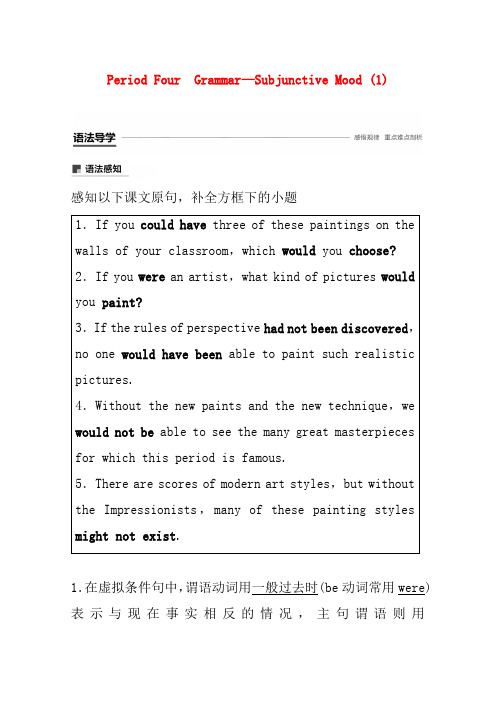
Period Four Grammar—Subjunctive Mood (1)感知以下课文原句,补全方框下的小题1.在虚拟条件句中,谓语动词用一般过去时(be动词常用were)表示与现在事实相反的情况,主句谓语则用“would/should/could/might+动词原形”表示。
(如句1、2、4和5)2.在虚拟条件句中,谓语动词一般用过去完成时表示与过去事实可能不符的情况,主句则用“would/should/could/might+have+过去分词”表示。
(如句3)虚拟语气是英语考查的重点之一。
虚拟语气用来表示说话人所说的话并不是事实,而是一种假设、愿望、怀疑或推测。
其使用情况如下:一、虚拟语气在if条件从句中的用法注意:1.虚拟条件句中有had,should,were时,可将if去掉,把had,should,were提到主语之前,即倒装结构,如:Were theyherenow,they couldhelp us.如果现在他们在这里,他们就能帮助我们。
HadIworked harderatschool,I’dhavegot abetterjob.如果我在学校学习更努力的话,就会找到一份更好的工作。
Shouldheagree togothere,we wouldsend himthere.要是他答应去的话,我们就派他去。
2.有时条件从句表示的动作和主句表示的动作发生的时间不一致,这类句子称为错综时间条件句。
此时主、从句动词的形式应根据各自所表示的时间进行调整。
Ifhe hadtaken myadvicethen,he wouldn’tbe introublenow. 如果那时他听取了我的建议,现在他就不会有麻烦了。
Ifshe wereto leave,I wouldhaveheard aboutit.如果她要走,我会听说的。
3.某些介词或介词短语,如butfor,without,副词或连词,如otherwise,however,or,but等也可以表达一个暗含的虚拟的条件,这种情况下要仔细阅读上下文的语境。
高中英语人教版选修6《Unit 1 Art》教案
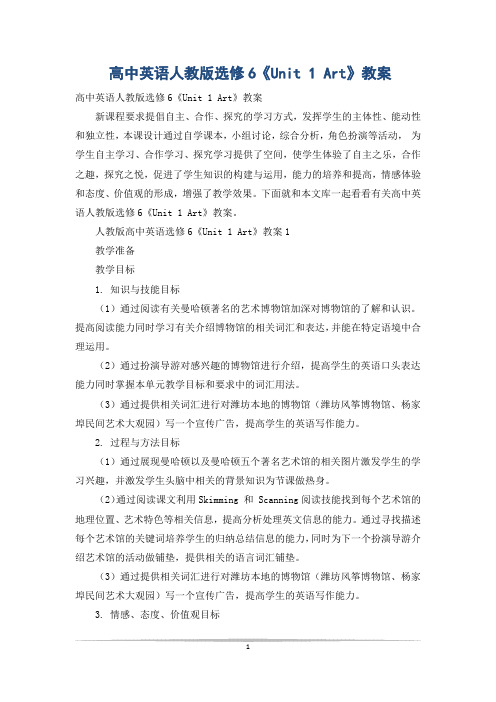
高中英语人教版选修6《Unit 1 Art》教案高中英语人教版选修6《Unit 1 Art》教案新课程要求提倡自主、合作、探究的学习方式,发挥学生的主体性、能动性和独立性,本课设计通过自学课本,小组讨论,综合分析,角色扮演等活动,为学生自主学习、合作学习、探究学习提供了空间,使学生体验了自主之乐,合作之趣,探究之悦,促进了学生知识的构建与运用,能力的培养和提高,情感体验和态度、价值观的形成,增强了教学效果。
下面就和本文库一起看看有关高中英语人教版选修6《Unit 1 Art》教案。
人教版高中英语选修6《Unit 1 Art》教案1教学准备教学目标1. 知识与技能目标(1)通过阅读有关曼哈顿著名的艺术博物馆加深对博物馆的了解和认识。
提高阅读能力同时学习有关介绍博物馆的相关词汇和表达,并能在特定语境中合理运用。
(2)通过扮演导游对感兴趣的博物馆进行介绍,提高学生的英语口头表达能力同时掌握本单元教学目标和要求中的词汇用法。
(3)通过提供相关词汇进行对潍坊本地的博物馆(潍坊风筝博物馆、杨家埠民间艺术大观园)写一个宣传广告,提高学生的英语写作能力。
2. 过程与方法目标(1)通过展现曼哈顿以及曼哈顿五个著名艺术馆的相关图片激发学生的学习兴趣,并激发学生头脑中相关的背景知识为节课做热身。
(2)通过阅读课文利用Skimming 和 Scanning阅读技能找到每个艺术馆的地理位置、艺术特色等相关信息,提高分析处理英文信息的能力。
通过寻找描述每个艺术馆的关键词培养学生的归纳总结信息的能力,同时为下一个扮演导游介绍艺术馆的活动做铺垫,提供相关的语言词汇铺垫。
(3)通过提供相关词汇进行对潍坊本地的博物馆(潍坊风筝博物馆、杨家埠民间艺术大观园)写一个宣传广告,提高学生的英语写作能力。
3. 情感、态度、价值观目标通过学习,使学生了解世界著名的艺术馆,培养学生的文化意识和对艺术的兴趣。
同时激发学生对家乡的自豪感和热爱之情。
- 1、下载文档前请自行甄别文档内容的完整性,平台不提供额外的编辑、内容补充、找答案等附加服务。
- 2、"仅部分预览"的文档,不可在线预览部分如存在完整性等问题,可反馈申请退款(可完整预览的文档不适用该条件!)。
- 3、如文档侵犯您的权益,请联系客服反馈,我们会尽快为您处理(人工客服工作时间:9:00-18:30)。
教学目标
1)To understand the text better
2)To master some useful words and expressions
重点
1.To understand the text better
Practice
1.On hearing the gunshot, the birds flew in all d______.
2. Do you think your w___ are strong enough to fly by yourself?
3. People living in the countryside can enjoy wonderful natural s_____.
5.know the props that are going to be used before going on stage
6. calm down and be confident when on stage
Step 5 Idioms about smiling & laughing
to laugh one’s head off: to laugh very hard
stage direction (舞台说明)
Act (幕)
Scene (场)
one-act play (独幕剧)
Step2 Word play
Match the words with the explanation
A: areas to the right and left of stage which the audience can’t see.
8.the area at either side of the stage that can not be seen by the audience
9.the clothes worn by actors in a play, or worn by somebody to make them look like something else.
lines & stage direction Zhang Yimou
张艺谋
A famous director
(paper in hand)
a person in charge of the whole performance
Cast (全体演员)
Director (导演)
Lines (台词)
Script (剧本)
B: screen that can be raised or lowered at the front of a stage.
C: platform of place on which plays are performed.
D: things used on a theatre stage to represent the place of action.
1.What do we call the person who acts in a play?
2.What do we call the person who is in charge of a play?
3.What is a script made up of?
4. What will an actor read in a script?
难点
1.To master some useful words and expressions
教法及教具
Talking, Practicing
教
学
过
程
教学内容
个案调整
教师主导活动
学生主体
活动
Step 1 Word study
Read the passage on Page 6, Part A. Pay attention to the words in blue, guessing the meanings of them.
How to be a good actor ?
1. listen to the director
2. learn lines by heart
3. find out when the character he or she is playing on stage
4.Байду номын сангаасdress in his or her costume and wait in the wings in time
1. To kill or not to kill, that is the question.
Do you know the names of the cast and the line in these
scenes(场景)?
the words that
the actors say.
2. Uncle Li is very angry; the consequence is very serious.
E: special style of dress for a particular activity.
1.scenery_______ 2.stage__________
3.curtains_______ 4.costume________
5.wings _______
Step 3 Word competition
4. Please read the s___ of the play first and try to keep the lines in mind.
5. Act1, S_____2 of ‘Hamlet’ is exciting.
Step 4 Discussion
Read part C, and discuss how to be a good actor.
5. What kind of play is called one-act plays?
6.a part of a play in which the action happens in one place
7.a small object used by actors during the performance of a play or film
